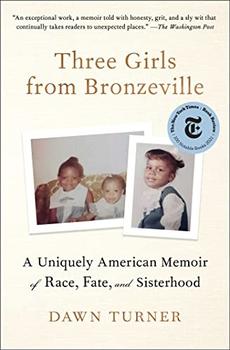Summary | Excerpt | Reviews | Beyond the Book | Readalikes | Genres & Themes | Author Bio

A Uniquely American Memoir of Race, Fate, and Sisterhood
by Dawn TurnerChapter One
Our Ledge
I often think about my sister and my best friend. Not every minute. Not even every day. I mostly think of them when I am experiencing something I would have wanted to share. Some moment that would allow us to tug on a line, thin as a filament, that begins "Remember when…" and draws a seemingly ever-present past nearer.
When I imagine us, we come into focus at our beginning—three young girls walking through our neighborhood under a prickly summer sun. I am nine years old, tall and lanky with long, ropy braids. Debra, my best friend, is shorter than me and, at eight and a half, is already prom-queen pretty. And then there's my sister, Kim, three years my junior. She's stealthily trailing us, even though I've bribed her with our mother's secret stash of lemon drops to stay away.
Mom is watching us from our eleventh-floor apartment window. She has told us to go outside and play.
"You two are the nosiest children God ever gave breath to," she always says. "Get out from under grown folks' business."
Later, she will ask me why I didn't hold Kim's hand, why I allowed her to hang so far behind. But right now, Debra and I are walking through our apartment complex on our way to our special place. We are Thing-Finders, two Black girls who have little in common with the popular children's book character Pippi Longstocking, an orphaned white girl with red hair and freckles. But we admire the way she spends her day collecting castoffs for her "Thing-Finders Club." We live in a neighborhood that has specialized in the broken, the halved—so in the tradition of this little white girl, we traverse our community, sifting through the past, searching for discarded items that we believe can be made new again. We call our hideout our "love spot," and it's a couple of blocks away. It's where we've stashed a rusty metal tin we stole from the janitor's closet. We've seeded it with the artifacts of our lives: my father's fake gold cuff link and a knob from her father's CB radio; a couple of dried pomegranate seeds; the obituary of our third-grade teacher's daughter; a scarred flashcube from an Instamatic; the shoehorn we lifted off the grocery store bagger who has gnarled hands and likes to pat us kids on our heads. We allow him when we're trying to show how brave we are.
To understand Debra, Kim, and me—to understand what will happen to us—you have to know the place that has begun to shape us. We live in Chicago's historic Bronzeville community. At three square miles, it's the cradle of the city's Great Migration, the epicenter of Black business and culture. Over the decades, it's been home to some of the country's most esteemed Black folks: journalist and antilynching activist Ida B. Wells, cardiac surgeon Daniel Hale Williams, jazz trumpeter Louis Armstrong, novelist Richard Wright, Pulitzer Prize–winning poet Gwendolyn Brooks. Kim and I are beginning to understand Bronzeville's storied past because our mother, grandmother, and aunt grew up here in this corner of Bronzeville that hugs the lakefront. Kim and I are the fourth generation of our family to live here. Anything you can imagine, or want, or hope for is here. The good life, made evident by Black politicians, doctors, lawyers, judges, and professors. A good time, as offered by prostitutes, street vendors, and drug dealers. It's all here, not on the other side of the tracks or the other side of a river or even the next "L" stop. It's just across the street. For generations, Bronzeville has been a place where all that was good and bad is simultaneously at your fingertips yet a walled-off world away.
We girls are coming of age at a time when the country is just beyond the civil rights movement and at the threshold of what our parents hope is a new, postracial era for Blacks. A country that finally seems amenable to giving us the opportunities it has denied generations. But that dream will soon be dashed.
Excerpted from Three Girls from Bronzeville by Jack Turner. Copyright © 2021 by Jack Turner. Excerpted by permission of Simon & Schuster. All rights reserved. No part of this excerpt may be reproduced or reprinted without permission in writing from the publisher.
What really knocks me out is a book that, when you're all done reading, you wish the author that wrote it was a ...
Click Here to find out who said this, as well as discovering other famous literary quotes!
Your guide toexceptional books
BookBrowse seeks out and recommends the best in contemporary fiction and nonfiction—books that not only engage and entertain but also deepen our understanding of ourselves and the world around us.